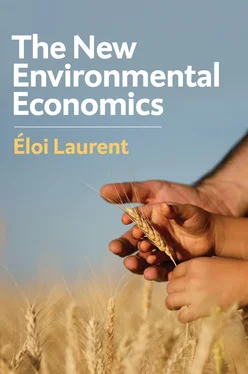120 104
121 105
122 106
123 107
124 108
125 109
126 110
127 194
128 111
129 112
130 113
131 114
132 115
133 116
134 117
135 118
136 119
137 120
138 121
139 122
140 123
141 124
142 125
143 126
144 127
145 128
146 129
147 130
148 131
149 132
150 133
151 134
152 195
153 135
154 136
155 137
156 138
157 139
158 140
159 141
160 142
161 143
162 144
163 145
164 146
165 147
166 148
167 149
168 150
169 151
170 152
171 153
172 196
173 197
174 154
175 155
176 156
177 157
178 158
179 159
180 160
181 161
182 162
183 163
184 164
185 165
186 198
187 166
188 167
189 168
190 169
191 170
192 171
193 172
194 173
195 174
196 175
197 176
198 177
199 178
200 179
201 180
202 181
203 199
204 182
205 183
206 200
207 201
208 202
209 203
210 204
211 205
212 206
213 207
214 208
215 209
216 210
217 211
For Sylvie, for Lila, for Jonas, with everlasting love
The New Environmental Economics
Sustainability and Justice
Éloi Laurent
polity
Copyright © Éloi Laurent 2020
The right of Éloi Laurent to be identified as Author of this Work has been asserted in accordance with the UK Copyright, Designs and Patents Act 1988
First published in 2020 by Polity Press
Polity Press
65 Bridge Street
Cambridge CB2 1UR, UK
Polity Press
101 Station Landing
Suite 300
Medford, MA 02155, USA
All rights reserved. Except for the quotation of short passages for the purpose of criticism and review, no part of this publication may be reproduced, stored in a retrieval system or transmitted, in any form or by any means, electronic, mechanical, photocopying, recording or otherwise, without the prior permission of the publisher
ISBN-13: 978-1-5095-3380-0 (hardback)
ISBN-13: 978-1-5095-3381-7 (paperback)
A catalogue record for this book is available from the British Library
Library of Congress Cataloging-in-Publication Data
Names: Laurent, Eloi, author.
Title: The new environmental economics : sustainability and justice / Eloi Laurent.
Description: Cambridge, UK ; Medford, MA : Polity Press, 2019. | Includes bibliographical references and index.
Identifiers: LCCN 2019017448 (print) | LCCN 2019021750 (ebook) | ISBN 9781509533831 (Epub) | ISBN 9781509533800 (hardback) | ISBN 9781509533817 (pbk.)
Subjects: LCSH: Environmental economics. | Sustainable development.
Classification: LCC HD75.6 (ebook) | LCC HD75.6 .L3785 2019 (print) | DDC 333.7--dc23
LC record available at https://lccn.loc.gov/2019017448
Typeset in 10.5 on 13pt Swift Neue
by Fakenham Prepress Solutions, Fakenham, Norfolk, NR21 8NL
Printed and bound in Great Britain by CPI Group (UK) Ltd, Croydon
The publisher has used its best endeavours to ensure that the URLs for external websites referred to in this book are correct and active at the time of going to press. However, the publisher has no responsibility for the websites and can make no guarantee that a site will remain live or that the content is or will remain appropriate.
Every effort has been made to trace all copyright holders, but if any have been overlooked the publisher will be pleased to include any necessary credits in any subsequent reprint or edition.
For further information on Polity, visit our website: politybooks.com
1.1 Three ages of human development
5.1 Oil prices, 2008 –2018
6.1 Renewable internal fresh-water resources per capita
7.1 European Union emissions of GHG in production and consumption
11.1 Globalization in the last 50 years
12.1 Percentage of population residing in urban areas by country, 1950 –2050
2.1The population (on-going) problem
3.1John Muir: Preservation and healing
3.2The rules of the game of environmental cooperation
4.1The top 20 of the “Toxic 100”
4.2The ecological debt
4.3The Cochabamba Declarations
4.4Air (ine)quality
4.5Environmental justice before the law
5.1Kenneth Boulding
5.2The monetary cost of air pollution
6.1Biodiversity, human development, and political freedom
6.2Fuel poverty in the UK
7.1Stanley Jevons and the “rebound effect”
7.2Four types of decoupling
8.1Taxing and subsidizing carbon
8.2How to mitigate climate change: A policy toolbox
9.1Energy transition in France: The négaWatt scenarios
9.2Three lessons from the Chinese growth experiment
9.3The Sveriges Riksbank Prize in Economic Sciences 2018
10.1Rousseau vs. Voltaire after the Lisbon earthquake of 1755
11.1The CETA and environmental policy
12.1The double penalty of urban sprawl: The case of France
12.2Urban well-being: The case of Paris
12.3Urban success stories
5.1 The many values of natural resources
9.1 Human well-being and the biosphere: The self-destructive vicious circle
9.2 Human well-being and the biosphere: The virtuous circle of sustainability
9.3 Three horizons for humanity: Well-being, resilience, and sustainability
10.1 The three linkages of sustainable development
10.2 Social-ecological trade-offs and synergies
5.1 Social discount rate options
5.2 Social cost of CO 2, 2010–2050
6.1 World fisheries and aquaculture
6.2 Evolution of global forest, 1990 –2015
6.3 Global and regional per capita food consumption, 1964 –2015
6.4 Energy use, 1980 –2014
7.1 The share of country groups in global material consumption in 2010
7.2 Physical and monetary trade of goods for the EU-28
7.3 Import dependency for the EU-28
7.4 Waste treatment in the OECD, 2013
7.5 Material flow accounting for Western industrial Europe, 1950 –2010
7.6 Absolute decoupling between GDP and CO 2in 21 countries
8.1 The global energy mix in 1973 and 2015
8.2 Renewable energy competitiveness
8.3 Global emissions of CO 2in 2016
8.4 Emissions of carbon dioxide in 2015, country ranking, and shares
8.5 A simple model of fair and efficient climate justice
9.1 Environmental contribution to some diseases
9.2 Environmental deaths in different regions of the world
10.1 Environmentally related tax revenue for some OECD countries, 1994 –2016
11.1 Internal and external water footprint (2011)
11.2 Goods transportation, 2000–2016
12.1 The global urban population, 2018 and 2030
12.2 Priority actions for a low carbon building strategy
12.3 Urban population in the EU-28 exposed to air pollutant concentrations (2012–2014)
Introduction: Economics for the twenty-first century
Are we thriving or are we doomed? That is the question. In our early twenty-first century, two radically different views regarding the fate of humanity on Planet Earth co-exist.
The first one insists on the remarkable prowess of humankind: Once fearful creatures deprived of almost any significant natural advantages in a hostile environment, we have managed in a matter of a few thousand years – and even more in the last two centuries – to become Kings of Nature, Masters of the Biosphere, Rulers of Life. Driven by the power of social cooperation, humanity’s journey toward prosperity in all corners of the world is truly impressive.
Читать дальше












